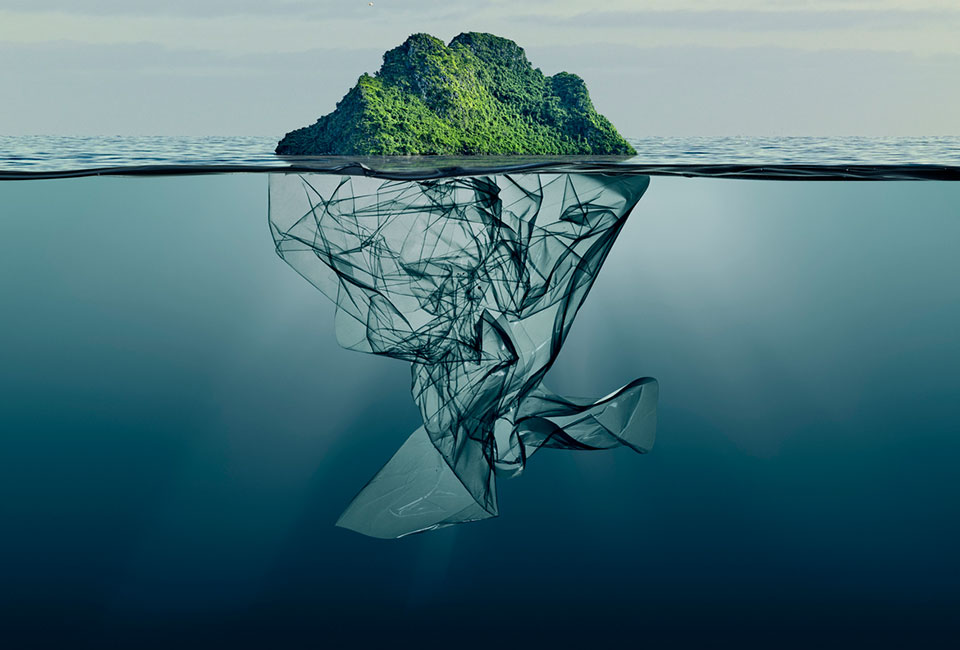
Plastic pollution has become one of the most pressing environmental and health problems. The non-profit organization OceanCare calls for a rethink and advises Switzerland to take a leading role in Europe.
The exponential increase in the production and consumption of plastic over less than two generations has made plastics ubiquitous. "From the Arctic to Antarctica and from the depths of the oceans to the peaks of the Himalayas, no corner of the globe is spared from the plastic tide," explains Fabienne McLellan, executive director of OceanCare and head of its plastics program. The plastics are in the form of microplastics in the air, in the water and in the food, we eat, she says. And she points out, "Plastics are not only a blight on nature, but also an increasing threat to the health of us humans."
Plastic problem is insufficiently addressed in Switzerland
The plastic problem affects Switzerland as much as any other country in the world. While the mountains of plastic may be more visible in other countries, it shows up in Switzerland in more diverse and insidious ways. McLellan knows, "Every year in our country, about 14,000 tons of macro- and microplastics find their way into soils, surface waters and their sediments. Of course, macroplastic pollution should also be reduced, but microplastic pollution is of even greater concern." (See also) Microplastic pollution in Swiss lakes and rivers is similar to that in the oceans, she says. However, microplastics can be found in considerable concentrations everywhere you look for them, even on the snow-covered peaks of the Alps, in remote mountain lakes or in nature parks. And she criticizes: "Switzerland maintains its image as a country of untouched nature, order and cleanliness. Switzerland is portrayed as the world champion in waste separation and recycling. The reality, however, is that much of Switzerland's plastic waste is incinerated." The report "Plastic Matters" by author Ewoud Lauwerier, an expert in plastic policy at OceanCare, shows that this very one-sided system of dealing with plastic, which focuses mainly on waste management, does not adequately address the plastic problem in Switzerland.
Switzerland relies heavily on incineration
Due to their lifestyle, Mr. and Mrs. Swiss have one of the highest per capita consumptions of plastic in the world, at 127 kg per year. In dealing with the waste generated by this resource-intensive lifestyle and sustained excessive consumption, Switzerland relies heavily on incineration, Lauwerier says. Recycling or even reuse rates are low, he says, and so most plastic in Switzerland ends up in incineration after only a short period of use. "This creates a hidden problem in the form of air pollution and highly toxic substances that remain after incineration. Only properly collected and processed plastic can be handled by waste management - through incineration or recycling," Lauwerier said. However, the problem of littering and of plastics that end up in the environment when used remains unsolved, he said.
Littering of plastics places an additional burden on the environment
In Switzerland, huge amounts of plastic end up in fields, forests, rivers, and lakes. Removing this plastic waste costs the country 200 million Swiss francs a year, Lauwerier estimates. While some of the waste is collected, many small items such as cigarette butts accumulate in the environment, especially away from residential neighborhoods, he said. According to the report, the plastics that enter the environment during use are microplastics from abrasion, decay or discharge from products that are made of or contain plastics. Tire abrasion, washed-out microfibers from clothing, microbeads or liquid polymers intentionally added to products are major sources of plastic pollution in the country. "Once they enter the environment, macro- and microplastics are part of the chemical cocktail whose potential risks to the environment and human health are slowly but surely coming to light," Lauwerier warns.
Politicians have so far been reluctant to use existing laws and regulation
In Switzerland, there are laws that could address many of these problems. Lauwerier cites the Environmental Protection Act or the Chemicals Act, among others, which contain provisions that could be used to stop the excessive use of single-use plastic. "In practice, however, the enforcement of these laws leaves much to be desired. The existing regulations do little to nothing to address the issue of plastic," McLellan criticized. This report, for which parliamentary interventions about plastics were analyzed in detail, aims to show that the Federal Council has so far been reluctant to use existing laws to regulate plastics more strictly. It prefers to rely on voluntary measures, he said.
Switzerland should take a leading role in Europe
OceanCare calls for a rethink. It says Switzerland should adopt a stricter regulatory approach and, instead of lagging behind, take a leadership role in Europe. Recent regulatory developments in the European Union could serve as an opportunity for Switzerland to think more deeply about plastics and the problems they pose, and to develop its own approach tailored to circumstances in Switzerland, the non-profit organization advocates. In addition, following the recent adoption of the resolution 'End Plastic Pollution: Towards an International Legally Binding Instrument' at the 2022 UN Assembly, UN member states have been asked to develop a national action plan to combat plastic pollution, it says. This offers Switzerland the opportunity to step up its efforts in the fight against plastic overconsumption and related problems, he said.